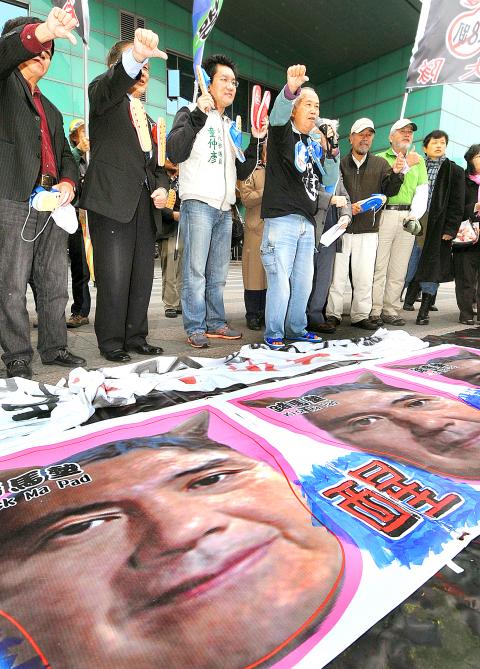Democratic Progressive Party (DPP) Chairman Su Tseng-chang (蘇貞昌) yesterday criticized the Chinese Nationalist Party (KMT) over its assets, saying the KMT administration had secretly sold its ill-gotten assets, pocketed substantial commissions from the transactions and used the profits to heavily subsidize the party’s election campaigns, spawning grave public grievance in the country.
Accompanied by lawyer Wellington Koo (顧立雄) and representatives from the Foundation of Medical Professionals Alliance in Taiwan, the Rotary Club and the Taiwan Junior Chamber, Su made the remarks at a press conference in Taipei, titled “Giving vent to fury” (火大找出路), which called on more than 1,000 civil groups to hit the streets along with the party in a planned mass demonstration in Taipei against President Ma Ying-jeou’s (馬英九) administration.
The rally, which is set to begin at 3pm on Jan. 13 at the intersection of Renai Road and Guangfu S Road, will be the last leg of the DPP’s one-month Fury (火大) campaign against what it says is the Ma administration’s poor governance.

Photo: Fang Pin-chao, Taipei Times
“The KMT has not only liquidated its unjustly solicited assets in secrecy, but has also received huge commissions from the sales. While the party has yet to reduce its assets to zero [as promised by Ma in his capacity as KMT chairman,] it has been using the stolen assets to subsidize election campaigns,” Su said.
Su’s criticism of the KMT came after a recent court ruling involving Hsinyutai Co, a spin-off of the KMT’s investment company — Central Investment Holding Co — which sued the buyers of Central Motion Pictures Corp (CMPC) for NT$2.5 billion (US$85.9 million) for breach of contract.
According to the ruling, handed down on Nov. 30, the Central Investment Holding Co had stipulated in the sales contract of the CMPC with Lor Yu-chen (羅玉珍) and Chuang Wan-chun (莊婉均) that the latter helped the holding company auction off several of its assets with an estimated value of NT$9.8 billion and then paid it a sum of the profits after deducting taxes and transaction fees if they were sold higher than a certain price.
The pair were sued for failing to liquidate such properties within a stipulated period and thus incurring financial damage to the holding company.
Turning to the soaring prices caused by the Ma administration’s plan to increase fuel prices and electricity rates, Su said last year had been a year of suffering and worries under the Ma administration.
Su said public fear over the possible bankruptcy of the Labor Insurance Fund by 2024 had resulted in a spike in the number of insurers applying for lump-sum payments in October and November last year, totaling more than NT$80 billion.
However, the Ma administration still raised premium rates for the fund on Tuesday and let the second-generation National Health Insurance system take effect on the same day, Su said.
Echoing Su’s opinions, Medical Professional Alliance in Taichung secretary-general Gao Chia-chun (高嘉君) said the number of people seeking self-pay treatments was on the rise, mainly because they could no longer afford their health insurance premiums.

US climber Alex Honnold is to attempt to scale Taipei 101 without a rope and harness in a live Netflix special on Jan. 24, the streaming platform announced on Wednesday. Accounting for the time difference, the two-hour broadcast of Honnold’s climb, called Skyscraper Live, is to air on Jan. 23 in the US, Netflix said in a statement. Honnold, 40, was the first person ever to free solo climb the 900m El Capitan rock formation in Yosemite National Park — a feat that was recorded and later made into the 2018 documentary film Free Solo. Netflix previewed Skyscraper Live in October, after videos

NUMBERS IMBALANCE: More than 4 million Taiwanese have visited China this year, while only about half a million Chinese have visited here Beijing has yet to respond to Taiwan’s requests for negotiation over matters related to the recovery of cross-strait tourism, the Tourism Administration said yesterday. Taiwan’s tourism authority issued the statement after Chinese-language daily the China Times reported yesterday that the government’s policy of banning group tours to China does not stop Taiwanese from visiting the country. As of October, more than 4.2 million had traveled to China this year, exceeding last year. Beijing estimated the number of Taiwanese tourists in China could reach 4.5 million this year. By contrast, only 500,000 Chinese tourists are expected in Taiwan, the report said. The report

Temperatures are forecast to drop steadily as a continental cold air mass moves across Taiwan, with some areas also likely to see heavy rainfall, the Central Weather Administration (CWA) said. From today through early tomorrow, a cold air mass would keep temperatures low across central and northern Taiwan, and the eastern half of Taiwan proper, with isolated brief showers forecast along Keelung’s north coast, Taipei and New Taipei City’s mountainous areas and eastern Taiwan, it said. Lows of 11°C to 15°C are forecast in central and northern Taiwan, Yilan County, and the outlying Kinmen and Lienchiang (Matsu) counties, and 14°C to 17°C

STEERING FAILURE: The first boat of its class is experiencing teething issues as it readies for acceptance by the navy, according to a recent story about rudder failure The Hai Kun (海鯤), the nation’s first locally built submarine, allegedly suffered a total failure of stern hydraulic systems during the second round of sea acceptance trials on June 26, and sailors were forced to manually operate the X-rudder to turn the submarine and return to port, news Web site Mirror Daily reported yesterday. The report said that tugboats following the Hai Kun assisted the submarine in avoiding collisions with other ships due to the X-rudder malfunctioning. At the time of the report, the submarine had completed its trials and was scheduled to begin diving and surfacing tests in shallow areas. The X-rudder,